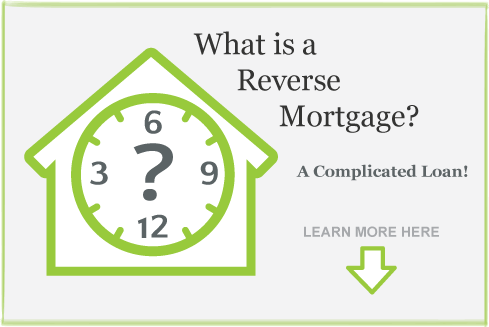Reverse Mortgage -What is A Reverse Mortgage
- Reverse mortgages are a complex financial tool.
- You need to go through a counseling session before taking a reverse mortgage.
- Learn the basic characteristics of a reverse mortgage loan.
What is a Reverse Mortgage? Not So Simple!
A reverse mortgage is a way to turn your house into cash, without selling the house or needing to make monthly principal and/or interest payments. Reverse mortgages are offered to people who meet two basic qualifications:
- Age: Borrowers must be over the age of 62.
- Equity: Your home (principle residence) must have sufficient equity. The amount of loan you get depends on the value of your home (less any current mortgages) and the age of the youngest borrower.
The basic idea of a reverse mortgage is that you can supplement your income and stay in your home. Instead of selling your home and moving into another place, you can stay in the comfort of your home and neighborhood. For many elderly people, a reverse mortgage provides the financial means to stay at home and receive extra income to pay for in-house aid or other expenses.
However, reverse mortgages are not simple loans. They are complex financial tools that need to be examined as part of your overall financial picture, retirement cash flow, and assets. Take the time to learn about reverse mortgages and their basic loan characteristics.
What is a Reverse Mortgage? Not free money!
It is extremely important that you consider a reverse mortgage as one part of your total financial picture. Your home is one of the most important assets you have. You will always have housing costs, whether you own, rent, or live in a nursing home facility. Even if you own your home free and clear, you have to pay for upkeep, property taxes, and insurance. For some, a reverse mortgage is a good solution to their cash-flow problems. For others, a reverse mortgage is a road to disaster.
A reverse mortgage comes with an obligation for you to pay back the loan. Although there is generally not a personal guarantee on a reverse mortgage, the proceeds of the sale of the property must be used first to pay off the loan. This can affect you in many ways including:
- You need to move away from the house and need the cash to buy another house
- A surviving spouse is left with insufficient funds to maintain monthly payments.
- A surviving spouse doesn’t have title on the house.
- There is no cash to leave to your heirs.
Reverse mortgages also are expensive. They come with high closing fees. Make sure that you consider all your alternatives, including downsizing to a less expensive home, taking out a home equity loan, or selling your home and renting instead. Speak to financial experts who can help you plan your retirement and manage your cash flow.
Quick Tip #1
learn about what is a reverse mortgage. Then, make sure you get a quote from a Bills.com reverse mortgage provider.
What is a Reverse Mortgage? A Loan!
Before you consider taking a reverse mortgage, understand the mechanics and the nuances. Here is a starter list, with some points to be aware of AND beware of, before taking a reverse mortgage. This is not a comprehensive list.

What is a Reverse Mortgage? A Complex Financial Tool!
You now can easily answer the question: "what is a reverse mortgage?" It is a complex high-risk financial tool to for retirement aged borrowers who have equity in their homes.
Does that mean that it is bad? No! The whole industry realizes that reverse mortgages are complicated mortgages. Counseling sessions for all HECM HUD sponsored reverse mortgages are mandatory. If you are the right type of borrower, then a reverse mortgage may be the right financial tool for you.
However, now that you have an idea of what a reverse mortgage is, learn more by reading some of Bills.com great reverse mortgage articles, including those about:
- How a reverse mortgage works
- What are the pros and cons of reverse mortgages
- Reverse mortgage fees and rates
Quick Tip
Ready to shop for a reverse mortgage? Get a quote from a Bills.com reverse mortgage provider.
